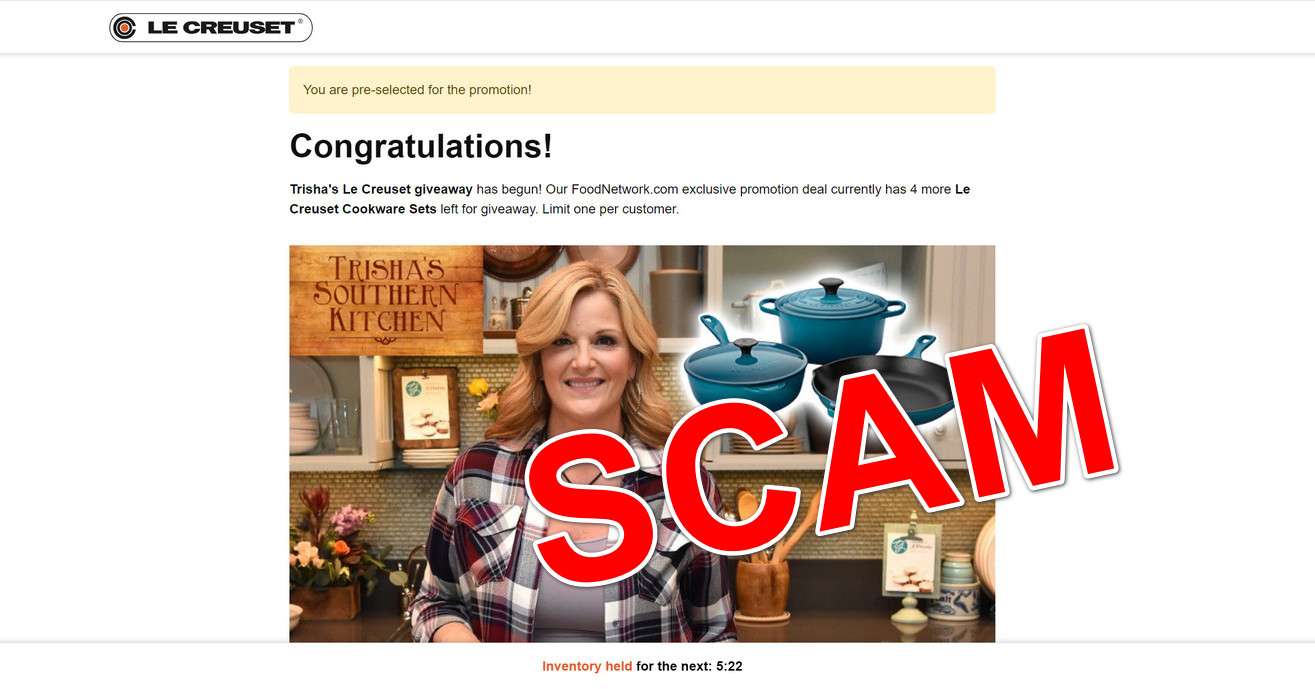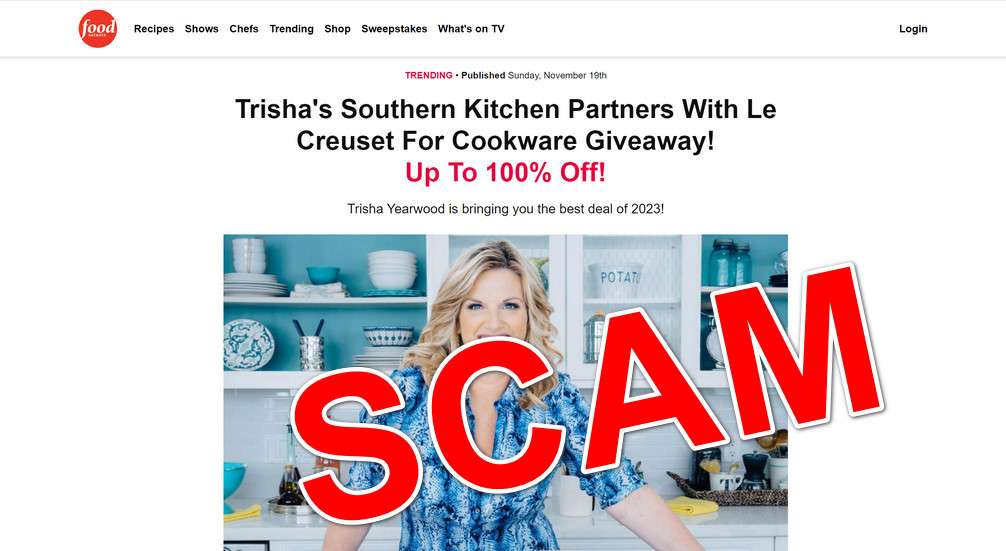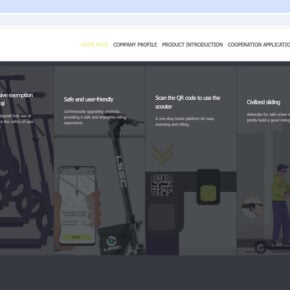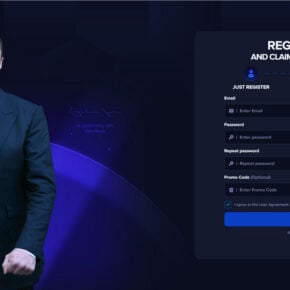A fraudulent online campaign has recently emerged across social media falsely claiming country music icon Trisha Yearwood has partnered with Le Creuset, gifting followers free Dutch ovens. However, manipulated advertisements actually intend stealing users’ personal and financial data rather than reasonably providing celebrity cookware donations. This exposé breaks down exactly how such appliance scams manage duping prudent individuals through emotional triggers and concealed deceit.
- Overview of the Elaborate “Trisha’s MEGA Giveaway” Le Creuset Scam
- How Users Get Systematically Duped By Appliance Scams
- Red Flags Exposing Fake Trisha Yearwood Giveaway Websites
- Spotting the Trisha Yearwood Giveaway Scams on Social Media
- What To Do If You Are A Victim of The Fake Trisha Yearwood Giveaway
- How to Avoid the Fake the Trisha Yearwood Scams
- Guidance On Avoiding Celebrity-Fronted Appliance Social Scams


Overview of the Elaborate “Trisha’s MEGA Giveaway” Le Creuset Scam
This increasingly common scam starts circulating online advertisements run across popular platforms like Facebook and Instagram. These feature deepfake AI video content portraying Trisha Yearwood enthusiastically explaining an exclusive holiday deal gifting free Le Creuset cookware sets if claiming quickly enough:
“Howdy y’all, Trisha Yearwood here with some exciting news!” exclaims the simulated promotional spots. “As a heartfelt thank you to all my amazing fans and followers celebrating the season of giving, I’ve teamed up with Le Creuset to give away some of their gorgeous new dutch ovens completely free!”
The fabricated Yearwood persona urges viewers act fast through clicking integrated links revealing voucher deal ownership details for securing the expensive kitchenwares simply covering minor $10 shipping labels.
However, users then get rerouted outside social media to various elaborate phishing websites like “parisgallerycafe.com” completely unassociated with Le Creuset or the real celebrity.
Decoy portal pages feature the Le Creuset logo alongside fake news articles depicting the epic giveaway. Website headers blare:
“Trisha Yearwood Followers Celebrate Winning $350 Le Creuset Bakeware In Special Holiday Giveaways Event – See Photos!”
This aims overcoming initial skepticism justifying requests later asking sensitive customer payment and personal data rather than raising red flags over unbelievable free merchandise requiring little initial investment.
After scrolling through fake dwindling inventory alerts and customer testimonials, visitors reach customized order forms promising delivery of the pricey cookware sets solely pending small $9.95 upfront shipping/handling fees.
However hidden subscription clauses discreetly authorize recurring monthly charges from shady partners rather than reasonable one-time payments expected under $10.
In the end, victims receive no high-end cooking products actually promised. But compromised information enables scammers inflicting financial damages through underground data sale channels thanks to unlocked credit card or account access handed over chasing deals too good passing initially.
How Users Get Systematically Duped By Appliance Scams
The fake “Trisha’s MEGA Giveaway” campaign conducts highly coordinated strategies luring victims through this deceptive process:
Step 1) Build Hype With Deepfake Celebrity Endorsement Videos
The scam starts using AI deepfake videos falsely portraying Yearwood endorsing the holiday Le Creuset giveaway. Her familiarity as a Food Network host builds initial social hype and wider reach.
Step 2) Direct Traffic Through Intermediate Phishing Websites
Clicking those videos sends viewers to polished portal pages like “parisgallerycafe.com” mimicking reputable brands. These feature Trisha imagery and contest details overcoming skepticism.
Step 3) Trigger Urgency and Social Proof to Incentivize Desired Actions
Fake dwindling inventory alerts and customer reviews compel reactively seeking scarce free goods rather than questioning abnormalities.
“Meet previous winners and learn how to participate for yourself before the limited-time Yearwood inventory runs out!” warnings pressure.
Step 4) Collect Users’ Financial Information and Personal Data
Customized order forms require excessive private sensitive input beyond reasonable needs justifying contest shipment logistics.
Step 5) Hide Recurring Charges in Fine Print
Buried terms disclose victims actually consent recurring charges exceeding $100 monthly when attempting promotions rather than reasonable one-time $10 costs depicted.
Step 6) Continuously Profit From Stolen Data and Unauthorized Billing
With access to compromised information, recurring charges activate alongside potentials for reselling data through underground channels – each inflicting long-term financial damages through manipulation or theft.
In summary, the celebrity appliance giveaway scam ensnares social media users through emotional triggers, urgency cues and concealed terms disclosing unreasonable financial objectives unrelated to reasonable giveaway transparency initially pitched. Always verify legitimacy and read the fine print before acting.
Red Flags Exposing Fake Trisha Yearwood Giveaway Websites
In coordination with manipulated social media posts, the celebrity appliance scam also leverages a network of deceitful external websites helping lend false credibility justifying requests for sensitive user payment information and data later.
Let’s explore several consistent suspicious website patterns exposing the underlying scam despite convincingly professional first impressions initially.
Impersonating Reputable News Brands Without Consent
Fraudulent portal pages deliberately display logos from established media authorities like Fox News, CNN or People Magazine without permission. This aims duping visitors into assuming previous journalistic review vetting unbelievable sweepstakes authenticity when none exists.
Fabricating Favorable Celebrity Endorsement Content
Another effective tactic giving illusion of third-party credibility involves crafting vivid celebrity quotes and imagery praising the epic holiday cookware giveaway. But further inspection reveals no records correlating the messages to any actual endorsement press releases.
For example, sites proclaim:
“I can’t wait to see fans unboxing new Le Creuset Dutch ovens this holiday season after entering my biggest giveaway!” says a falsely attributed Trisha Yearwood quote. “Get yours before inventory runs out!”
This intends lowering visitor guard for later requesting financial disclosures rather than transparency reasonably offering merchandise in exchange for little initial investment.
Burying Fine Print Legalese Detailing Recurring Account Charges
While prominent graphics prompt urgent participation scarcely reviewing rules, buried terms and conditions passages reveal victims registering for expensive $100+ monthly subscription charges rather than reasonable one-time coupon shipping fees securing “free” devices as depicted repeatedly earlier. This clearly demonstrates intention eliciting finances deceptively versus transparency around contests.
So while holiday sweepstakes tied closely to celebrity status tempt engagement on surface levels, applying extra scrutiny protects individuals from preventable privacy and financial damages consistently. Carefully assess emotional hooks against objective details revealing contradictory facts when analyzed deeper beyond initial impressions.
Spotting the Trisha Yearwood Giveaway Scams on Social Media
In addition to external fraudulent websites, the supposed Trisha Yearwood free Le Creuset giveaway also flows heavily through major social channels like Facebook, Instagram and TikTok using manipulated video content and psychological tactics deceiving users.
Let’s review what signals commonly expose the questionable cookware promotion on each platform.
Facebook Tactics Exploiting the Le Creuset Giveaway
Exercise caution towards Facebook posts exhibiting these common problems:
- Video advertisements using deepfake celebrity media endorsing free cookware offers
- Links in unpaid posts/descriptions rerouting outside Facebook to unvetted domains
- Profiles spreading hype demonstrate very limited previous activities
- Comments emphasize contest excitement rather than reasonably questioning abnormalities
For example, deepfake spots claiming Trisha Yearwood gifted Le Creuset sets deserve scrutiny before engagement.
Suspicious Instagram Approaches Promoting Cookware Scams
Analyze these questionable Instagram elements connected to free Le Creuset offers:
- Trisha Yearwood tagged in unrelated side accounts she didn’t create herself
- Captions urge immediate actions through risky external links to “claim” prizes
- Profiles discuss only contest details without expected personal sharing
- Locations list foreign countries unrelated to known U.S. corporate operations
Specifically, any Instagram post pretending affiliation with Trisha Yearwood’s authorized contests deserves reasonable vetting before proceeding.
Dangerous TikTok Videos Promoting Appliance Scams
Apply extra caution towards TikTok videos exhibiting these problems:
- Sophisticated deepfake edits depicting Trisha Yearwood endorsing free cookware
- Links in captions route clicking traffic outside platform protections
- Uniformly positive comments focused exclusively on urgent participation
- Strong calls-to-action incentivize rapidly reacting contradicting logic vetting
If you spot an oddly persuasive video diverting outside links seemingly too good believing, independently verify authenticity first. Across all social channels, supposed celebrity-tied opportunities sacrificing little for substantial personal gain warrant reasonable inspection before participation, protecting oneself from preventable damages later. What seems too good often is until proven otherwise. Maintain healthy skepticism.
What To Do If You Are A Victim of The Fake Trisha Yearwood Giveaway
If now facing unauthorized recurring charges after questionable free trials, immediately act:
Step 1) Contact Financial Companies About Detected Fraud
Alert pertinent banking and credit institutions regarding an appliance scam discovery using celebrity endorsements enacting account charges without consent. Launch disputes and request temporary reimbursements during investigations.
Step 2) Attempt Canceling All Related Subscriptions
Collect customer service contact information from related monthly billing statements. Call providers clearly revoking authorization now aware those situations took advantage through deception rather than reasonable terms initially disclosed. Record details should charges persist which is common dealing with untrustworthy groups needing extensive consumer protection filings once scammed.
Step 3) Enable Extra Account Protection Measures
Since compromised information retains vulnerabilities, immediately update passwords and enable stronger multi-factor authentication across pertinent logins. Consider proactive credit monitoring or freeze services informing suspicious activities needing quick intervention as well.
Step 4) Lodge Complaint Reports With Relevant Fraud Agencies
File complete reports about offending companies, scam portals and damages incurred under false pretenses with pertinent government and consumer protection groups. Provide all available website names and header images displaying unauthorized trademark usage alongside celebrity media used facilitating initial deception.
Such filings support investigating broad repeat offender patterns eventually assisting negatively impacted victims who initially believed misrepresentations without proper hesitation.
How to Avoid the Fake the Trisha Yearwood Scams
While highly convincing initially, several consistent suspicious signals help reveal when appliance giveaways likely intend facilitating financial theft rather than reasonable charity:
1. Unauthorized Celebrity Affiliation Claims
- No evidence across Trisha Yearwood’s statements or accounts confirms sponsoring free Le Creuset giveaways recently.
2. Urgency Tactics Incentivizing Haste Over Logic
- Pressure triggers like countdowns and limited supply claims stimulate emotional reactions circumventing critical vetting.
3. Highly Suspicious Behavior Histories
- User profiles spreading significant contest hype often demonstrate very limited previous genuine platform activities bringing legitimacy doubts.
4. Intermediate External Website Links
- Redirects through unaccountable domains detach followers from internal moderation protections into uncontrolled environments ideal for scams wanting no public accountability.
5. Monthly Subscription Charges Buried In Fine Print
- Recurring fees exceeding $100 contradict reasonable one-time $10 shipment descriptions.
By recognizing these patterns early, individuals avoid compromising privacy, data and finances better scrutinizing questionable celebrity-tied contests before participation. Apply skepticism rather than assumptions around online philanthropy.
Guidance On Avoiding Celebrity-Fronted Appliance Social Scams
The key guidance for dodging scams involving famous figures:
1. Independently Fact Check Legitimacy Through Unbiased Third Party Research
If promotions seem questionable, thoroughly vet endorsement claims and product availability specifics through impartial objective authoritative sources before acting. Never assume automatic transparency or accuracy around incredible offers tied to household celebrity names and faces.
2. Carefully Analyze All Legal Terms, Conditions and Disclosures
Closely studying the often densely packed fine print frequently exposes unreasonable charges contradicting reasonable expectations set through straightforward initial advertisements. Always expect some opacity from marketers around crucial financial and privacy related details.
3. Consider Both Individual and Collective Warning Sign Red Flags
No single suspicious signal alone confirms underlying fraud risks definitively. However, collectively step back assessing inconsistencies around urgency cues, domain names chosen, comment irregularities and disclosure contradictions can reveal bigger picture perspectives on scam likelihood informing safer personal choices.
4. Ethically Report Suspected Predatory Scam Attempts
Even if financial damages seem minimal presently, reporting suspected tech appliance fraud through documenting website links, fake celebrity imagery patterns and violation of trust concerns helps all consumer groups avoid repeated predatory targeting over time as oversight agencies build cases against orchestrators forcing increased compliance and accountability through policy changes.
In conclusion, today’s technologies let scammers easily imitate trusted celebrity figures through social channels precisely hoping to exploit psychological vulnerabilities rather than demonstrating genuine corporate contest goodwill assumed automatically by followers. But individuals maintain power securing assets by insisting key claims face external unbiased verification prior to ever confirming participation or providing sensitive data during experiences wrapped too perfectly. Don’t become the next preventable victim chasing questionable “no-brainer” windfalls detached from reality. Instead exercise persistent vigilance better safeguarding your long-term interests.




